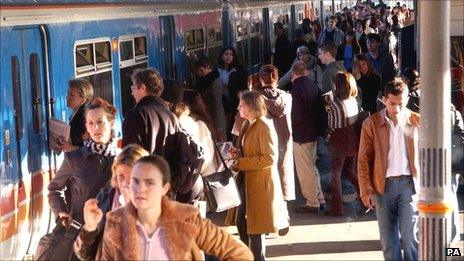What do rail delay excuses really mean?
- Published
- comments

Rail passengers want franker and more factual explanations of delays, a report suggests. So how do you decode the excuses for lateness?
The train expected at Platform 4 is no longer just delayed, behind schedule or late.
Over recent years, ever more opaque explanation has spilled out of the nation's station tannoys - much to the annoyance of commuters. A driver late for their shift is a "staffing problem", while "passenger action" is used to describe everything from violence against staff to a sit-in.
The rail passengers' lobby group Passenger Focus commissioned a report, which highlights the growing exasperation with the messages coming from train companies when the trains aren't turning up. The report says commuters want more information on when services resume so they can possibly find an alternative, but it also lists the lack of plain English as a major bugbear.
Here, we list five real-life reasons why services fail, and get rail experts to decode them.
Reason for delay: "Tanking train toilet"
What is it?: Refilling the water tanks used for flushing the train toilets.
According to Guy Dangerfield, the rail passenger manager at Passenger Focus, the problems with reasons fall into two camps - overly technical terms, or generic and bland.
This is one which falls into the first camp. "You have to wordsmith it a bit to get the right phrasing. But there must be a better way to explain there's a delay because they're filling up the water tanks so the toilets can flush. There is a very general challenge for any industry where the language and the dictionary isn't how the customer speaks."
Reason for delay: "Passenger action"
What does it mean?: Anything from abuse of staff to doors being opened on moving trains.
Rail industry journalist Roger Ford is a man used to the jargon of the trade, but admits there is room for confusion.
"Passenger action could [even] be people opening the doors and jumping off the train because they're tired of waiting," he says.
"But you have to remember these messages might be coming from the control room, so the staff are depending on what they are told. You have to look at the point of view of the control room staff, who might be having to pass the information out to other driver."
Air traffic controllers are in a similar situation. They must use precise and often technical language for reasons of safety, but passed on to an outsider it sounds like baffling jargon.
"There's a conflict between giving people important information or going back and checking the exact reason," says Ford.
Reason for delay: "Poor railhead adhesion"
What is it?: Slippery tracks due to snow, rain, or leaves on the line.
Rail companies have been ridiculed for admitting snow or leaves on the line have led to delays - not a laughing matter, as mulch or snow can cause braking problems.
"This one is a bit of a paradox," says Dangerfield. "It's quite a precise explanation, but it's quite difficult to convey to people. You're trying to convey the message that weather conditions are not letting the trains grip the tracks as they would on a sunny day."
Reason for delay: "Congestion at London Bridge"
What does it mean?: The station is too busy.
"This means it's due to overcrowding at the station," says Mr Ford. "It means you can't allow more people on the platforms because they might push each other on to the tracks.
"I guess what you need is some kind of Plain English campaign, which has done wonders for written language. What are the confusing terms? Give the drivers a little book that says, 'When you're told this, this is what you tell the passengers.'"
Reason for delay: "Signalling problems or vandalism"
What does it mean?: [Often] cable theft
The theft of copper wiring is a growing problem on the rail network as the global price of metals continues to rise. But you are unlikely to hear these incidents described as such - they're more usually covered by generic phrases such as vandalism.
Dangerfield is not sure why. "It's described as a signalling failure because that's a consequence of it, or it will be described as vandalism. I don't know why they don't say 'It's because some so-and-so has stolen 150 yards of cable.' That's going to get people on-side."
Dangerfield says the big question that needs to be asked is "how can the language used during service disruption be changed so that passengers believe what they're being told and understand what they're being told".
It's a problem the train companies say they are addressing.
"We understand that people want information that is straightforward and jargon free and we admit that that's not always the case at the moment," says a spokesman for the Association of Train Operating Companies.
"We are looking at this as part of a wider programme to improve the information that train companies provide for passengers during disruption."